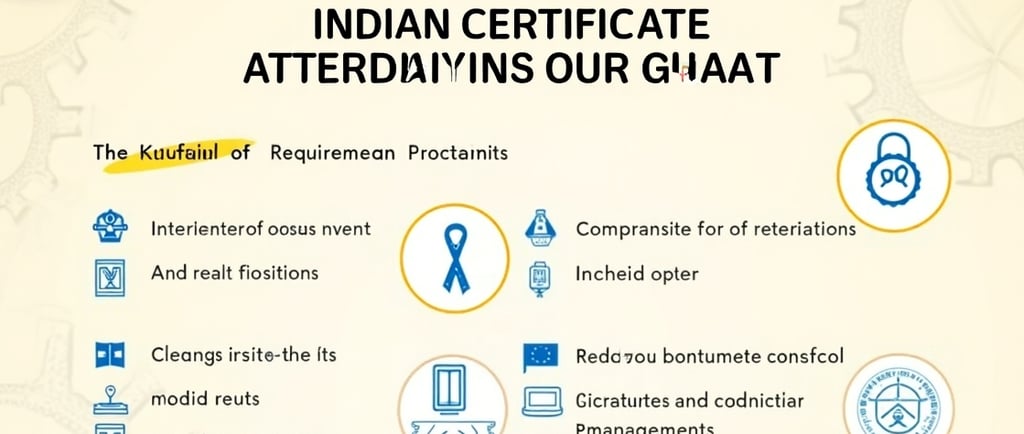Indian Certificate Attestation for Kuwait: Complete Procedure & Requirements
7/17/20254 min read


Understanding Certificate Attestation
Certificate attestation refers to the official verification process by which a document is certified as authentic and legally valid. For expatriates moving to Kuwait, this process is essential to ensure that their documents, such as educational certificates, marriage certificates, and professional qualifications, are recognized by Kuwaiti authorities. The importance of certificate attestation cannot be overstated, as it plays a crucial role in facilitating employment opportunities, securing residence permits, and fulfilling other legal obligations in Kuwait.
Various types of documents require attestation, particularly those that are likely to be presented in legal or professional contexts. Educational certificates, for instance, must be attested to validate one’s qualifications when seeking employment. Marriage certificates may also require attestation to ensure legitimacy when applying for family reunification or residency visas. Similarly, professional licenses and other pertinent documents must undergo this process to affirm their authenticity.
It is important to note the distinction between certificate attestation and apostille. While both processes serve the purpose of document verification, they are used in different contexts. An apostille, for example, is a specific type of certification provided under the Hague Convention, primarily used for international recognition of documents among member countries. In contrast, certificate attestation is often nation-specific and involves multiple authorities confirming the legitimacy of a document for use in a particular country, such as Kuwait.
In the Indian legal framework, the process of certificate attestation involves several steps, typically beginning with verification from local authorities followed by attestation from the Ministry of External Affairs (MEA) and relevant embassies. This multilayered process ensures that documents retain their legal standing when presented abroad, thus enhancing their validity and effectiveness in addressing the bureaucratic requirements one may encounter in Kuwait.
Documents Required for Attestation
When embarking on the journey to attain Indian Certificate Attestation for Kuwait, it is crucial to understand the specific documents required to ensure a smooth and successful process. The type of documents needed can vary based on the purpose of stay in Kuwait, but generally encompasses a range of educational and personal credentials.
For individuals seeking employment or educational opportunities, essential documents include original degree certificates, mark sheets, and diplomas issued by recognized educational institutions. These documents must be attested at both the regional level and by the Ministry of External Affairs (MEA) in India before submission to the relevant authorities in Kuwait. It is advisable to provide photocopies of these educational documents alongside the originals, as authorities often require both for verification purposes.
In addition to educational credentials, personal documents such as passports, birth certificates, and marriage certificates may be necessary. A valid passport must be submitted in original alongside its photocopy, as this serves as proof of identity and citizenship. Birth certificates are often required for dependents, while marriage certificates might be needed for those traveling with a spouse. All personal documents must also undergo the attestation process, ensuring that they are recognized internationally.
Furthermore, it is essential to fulfill any prerequisites that may be set by the Kuwaiti government, which might include notarization of certain documents. This step solidifies the authenticity of the documentation being submitted. When gathering documents for the attestation process, be mindful of maintaining both original documents and their photocopies, as this can significantly expedite the verification process.
Step-by-Step Attestation Procedure
Attesting Indian certificates for use in Kuwait is an essential process that ensures the validity of your documents. Here is a comprehensive step-by-step guide detailing the procedure involved.
Firstly, gather all necessary documents required for attestation. This typically includes your original certificate, a photocopy of your passport, and any additional identification as required. Ensure that these documents are correct and complete to avoid delays. Once prepared, the next step involves getting your document attested by a Notary Public, which serves as a preliminary verification of your certificate.
Following this, you must have your document authenticated by the concerned state authority, such as a Home Department or Education Department, depending on the nature of the certificate. This attestation confirms that the document is genuine and was issued by a recognized institution. It is advisable to check the specific requirements of your state, as procedures may vary.
Afterward, proceed to the Ministry of External Affairs (MEA) in India. The MEA is responsible for the final verification of documents intended for international use, including those for Kuwait. You may need to fill out an application form, and it is important to be aware of the fees associated with this service, which can vary based on the type of document being attested. Typically, processing times can range from a few days to a couple of weeks, so plan accordingly.
The next step is to approach the Kuwaiti Embassy or Consulate in India. Present the previously attested documents along with any scheduled fees. The embassy may have specific requirements, so it is wise to check their website or directly contact them in advance.
Completing these steps will culminate in the successful attestation of your Indian certificates for Kuwait. It is crucial to follow all guidelines closely and keep track of each procedure to ensure a smooth attestation process.
Tips for Successful Attestation and Common Challenges
Successfully navigating the Indian certificate attestation process for Kuwait requires careful planning and awareness of common hurdles. To start, ensure that all your documents are accurate and up-to-date. This includes verifying names, dates, and other critical information on certificates, which can otherwise lead to discrepancies that delay the attestation process. It is wise to have your documents organized, as this not only simplifies the submission but also enables quick access should any issues arise.
Another key element to a smooth attestation experience is understanding the typical timeline involved. Certifying authorities may vary in processing times, influenced by factors such as seasonal workloads or specific jurisdictional requirements. Therefore, applicants are encouraged to begin the attestation process well in advance, allowing ample time for any unforeseen delays. Knowing the approximate timeframes for each stage of the verification and authentication process can help set realistic expectations.
Selecting a reliable attestation service or agent is critical. Do thorough research to find reputable providers who can assist with the Indian certificate attestation for Kuwait. Customer reviews, recommendations from friends or colleagues, and evaluating the agency's experience can play significant roles in this decision-making process. A professional agent can help guide you through specific attestation requirements and mitigate potential challenges.
Lastly, remain informed and proactive throughout the process. Regular communication with your service provider can facilitate quicker resolutions to any issues that may arise. Being equipped with knowledge regarding the attestation procedure can help avoid unnecessary complications and ensure compliance with the regulations set by Kuwaiti authorities. Taking these tips into account will enhance your overall experience, making the process of Indian certificate attestation for Kuwait much more manageable.
